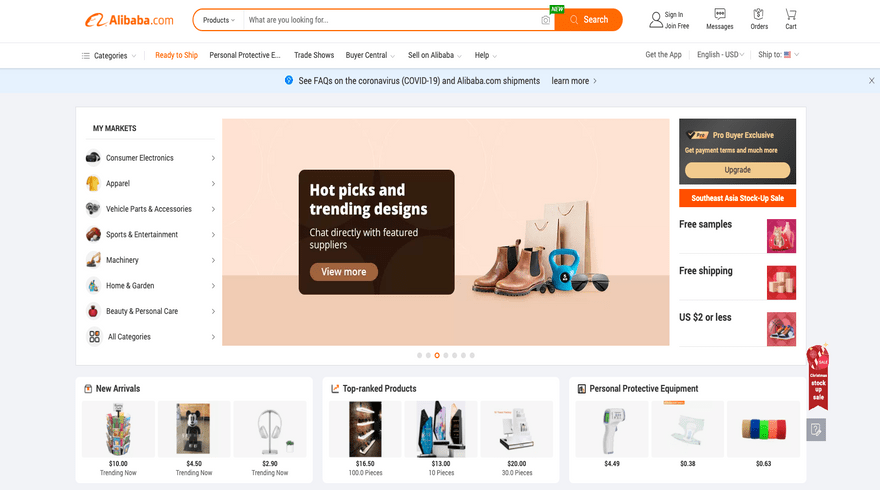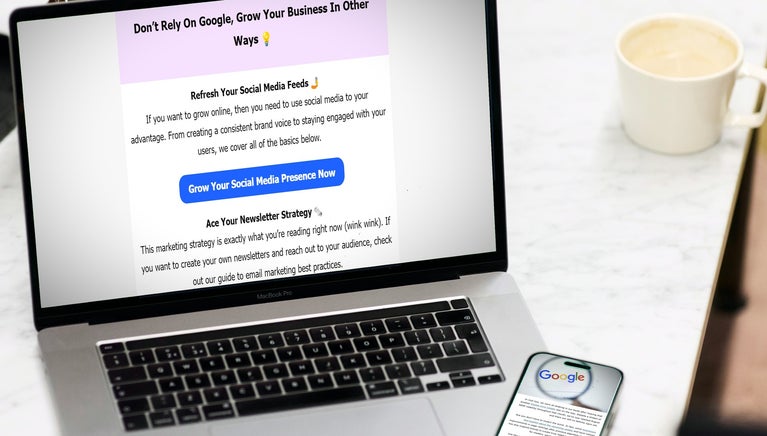How to Get Sellers for Your Ecommerce Website
If you click to purchase a product or service based on our independent recommendations and impartial reviews, we may receive a commission. Learn more
From securing a memorable, high-impact domain and creating your site, to uploading products and learning how to manage your ecommerce site successfully, starting an online store can be a lot of work.
So why do people do it?
They do it because ecommerce can be a massively lucrative business.
But did you know that you don’t necessarily need to sell anything in order to own a successful and profitable ecommerce site? In this guide, we’re going to walk you through how to find external sellers for your very own ecommerce marketplace.
What are Ecommerce Marketplaces?

To put it simply, an ecommerce marketplace is an online store that specializes in selling products from multiple different sellers. Although a marketplace owner may also sell their own stock through the platform, what makes them a marketplace is the access they grant other sellers to their audience.
To explain an online market, you can use a traditional (physical) market as an example. Someone owns the land, and allows multiple market traders to sell on that land in exchange for payment. The market owner is also likely to promote the market in order to make it more attractive to traders – and allowing the market owners to charge more in the process.
Similarly, an online marketplace owner allows other businesses to sell on their website in exchange for a flat fee, or – more commonly – a commission of the sale. The marketplace owner will usually execute marketing such as paid ads and online advertising to increase the desirability of the marketplace, and increase the commissions they earn.
Some of the world’s biggest businesses and websites are online marketplaces. These include:
- Amazon
- Etsy
- eBay
- Alibaba
- Walmart
Why are Online Marketplaces so Competitive?
It isn’t just business behemoths that run marketplaces. Many smaller marketplace websites exist, too – many that focus on a specific niche.
Whether big or small, running a marketplace is highly competitive for several reasons. Firstly, you need to convince sellers that your marketplace is worth them losing a certain percentage of sales to commissions. This means that you’ll have to drive high levels of high-value traffic to your site with consistency.
As marketplaces can be highly lucrative, you also need to prove to sellers that your site is a better option than your competitors. This can be done via offering lower commissions, or offering greater exposure to potential buyers.
How to Attract Sellers to Your Ecommerce Marketplace
So, we’ve established that ecommerce marketplaces can be lucrative – but also that finding sellers for your site can be highly competitive. In this section, we’re going to offer you some tried and tested ways to attract sellers to your marketplace.
The methods we outline below are a combination of inbound and outbound sales and marketing techniques. This means that some methods require proactive outreach and communication with potential sellers, whereas others focus on making your site so attractive that sellers just can’t keep away.
Use Competitor Websites

Our first tip is a little sneaky, yet perfect for finding relevant and engaged sellers for your marketplace.
Competitors’ websites are a treasure trove of info for marketplaces that are just launching, or more established presences looking to grow their reach. And the process is simple:
- Find your competitors
- Visit their website
- Search for products/sellers
- Contact the sellers about selling on your marketplace
It’s preferable to reach out to sellers externally to your competitors’ sites. You may do this by conducting a quick Google search and contacting them through their website, or finding them on social media and dropping them a direct line.
When messaging potential new sellers, it can be beneficial to find out the deal they currently have with your competitors, such as how much commission they pay on each sale. If you can beat their offer, you can include this in the message as a powerful way to compel them to join your marketplace.
Define Your Vendor Segment
Although this isn’t a direct tip for attracting sellers, it’s a powerful way to clarify your sales and marketing messages, and really compel sellers to join your marketplace.
Spending time to clearly define your vendor segment will help you achieve three goals:
- Market directly to your potential customers (sellers)
- Offer specialist tools and support
- Improve your value by targeting specific customers (buyers)
Leverage Digital Advertising & Marketing

This one’s simple, yet effective. Digital paid advertising is an easy way to increase awareness amongst potential buyers and drive them to your marketplace. Some options include:
- Social media advertising (Facebook, Instagram, Twitter, Pinterest, TikTok)
- Search engine advertising
- Display ads (especially if you can target competitors or relevant websites)
Once you’ve defined your vendor segment, it’ll become much easier – and more lucrative – to target them through paid advertising.
You may also look for ways to boost seller engagement through marketing in similar ways. For example, you can seek to grow your social media following organically, boost your site’s Search Engine Optimization (SEO), or publish guest posts on other relevant websites for valuable backlinks.
Online Listings
Online listings can be a great way to get your business in front of those who matter most.
For example, you may take advantage of free business listings, such as Google My Business or Superpages. As these listings are typically based on location, they’ll work best if your marketplace focuses on a local market.
Other business listings – such as starting a LinkedIn or Facebook business page – can be a good way to promote your marketplace to a wider audience. This will allow you to cultivate a loyal following around your marketplace, helping further promote it.
You may also use popular social media platforms such as LinkedIn and Facebook to promote events. For example, you may run a training event to get sellers started on your marketplace, and promote it through these channels with posts and links to live webinars. This is especially beneficial if you deal with sellers of complex products and services.
Email Marketing
Email marketing is a tried and tested way to promote any business, including online marketplaces. Regularly sending high-value emails to a list of potential sellers will help you engage them, raise awareness of your marketplace, and compel them to sign up.
Successful email marketing relies heavily on a relevant email marketing list. This can be achieved through slowly growing your own list, or purchasing access to a pre-made email marketing list.
This option is best for marketplaces that have substantial value to add to their potential sellers. For example, sending emails with top tips for growing your business could be a good way to build awareness and trust. However, using email marketing for direct advertising is unlikely to produce good result – at least until you’ve built a good level of trust with your audience.
For this reason, email marketing can be a better tool for more established marketplaces – particularly those with expertise in their space.
Showcase Successes
When you help your customers (sellers) achieve great success, shouting about it is a great way to make others stop and take notice of what you’re doing. This can be done in several ways, which include:
- Producing seller testimonial videos
- Writing case studies
- Posting key stats of customer success on social media and your website
You can also shout about your success when it comes to driving customers (buyers) to your site. This might include publishing information on customer numbers of average customer purchases. The benefits of this are obvious – the more potential buyers you attract, the more appealing your marketplace will be to potential sellers.
This method of promotion is best suited to well-established marketplaces that have a track record of success. It’s also important to ensure that you’re regularly communicating successes that are greater than – or at least comparable to – those of your competitors.
Offer Transparent and Competitive Commission
This is a simple way to promote your marketplace in competitive markets. Being transparent about the commission you collect will help sellers understand exactly the sort of profits they can expect to see when working with you.
Being transparent about commission is particularly powerful when you’re one of the most competitively priced options available to potential sellers.
Provide Guides
It’s true that money drives most business decisions. And it’s also easy to assume that – by offering the best rates or the biggest customer base – you’ll automatically become the most attractive marketplace out there. But this isn’t the case!
A big factor that sellers will account for when assessing a potential marketplace is how much time and effort it will take to get started on the site, and grow their presence there.
One simple way to show just how easy it is to use your marketplace is to offer straightforward – yet comprehensive – guides. This information can cover everything from applying to sell on your site and getting started, to how to become a successful seller.
Getting Sellers for Your Ecommerce Website: Summary
Starting an ecommerce marketplace can be profitable, but can also be incredibly competitive – and a lot of hard work. By following some of the tips we’ve highlighted in this guide, you’re sure to attract plenty of active sellers, and see some solid marketplace success.
So, why not give them a try and see how many new sellers you can bring onboard? Good luck!

4 comments